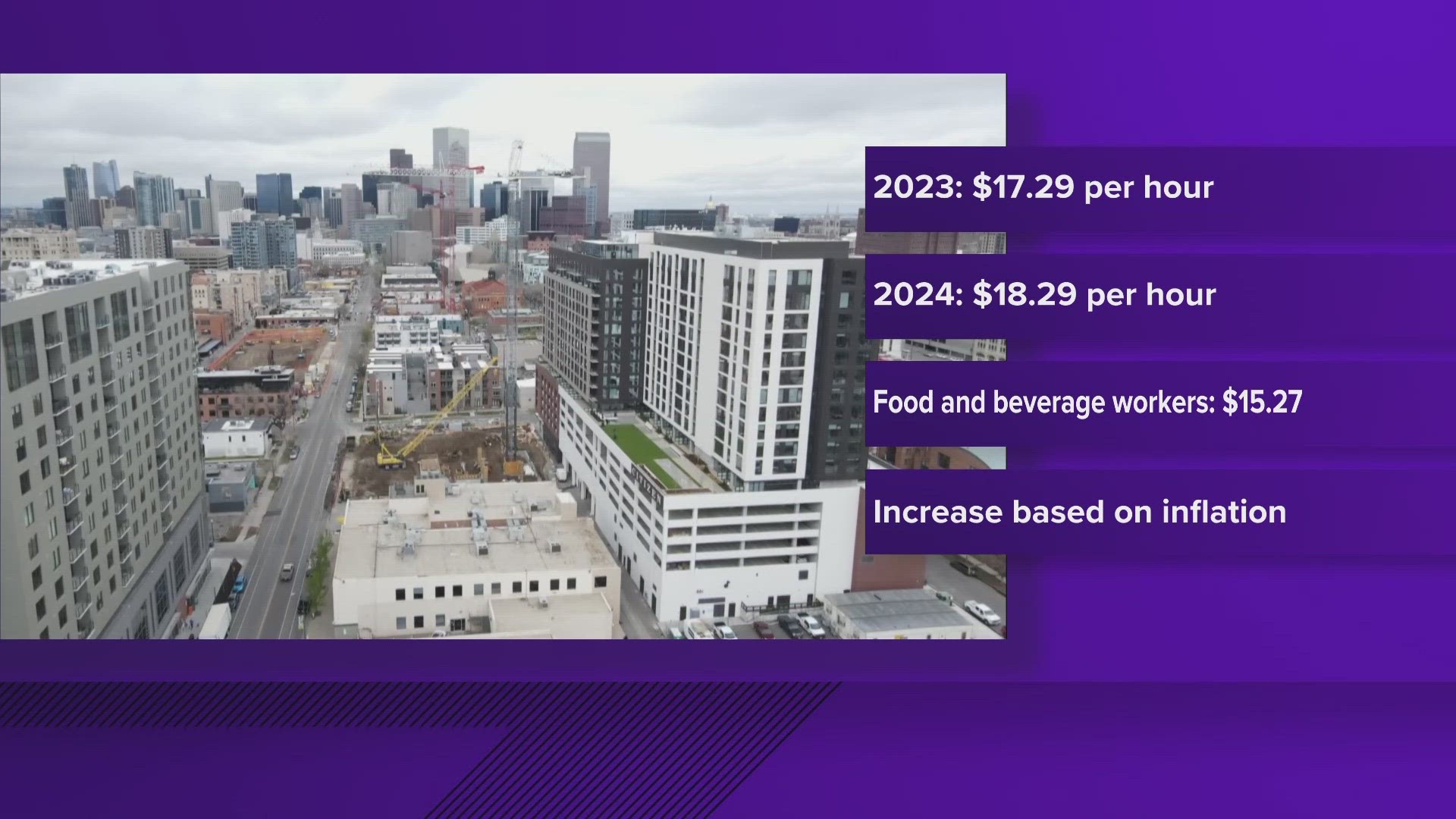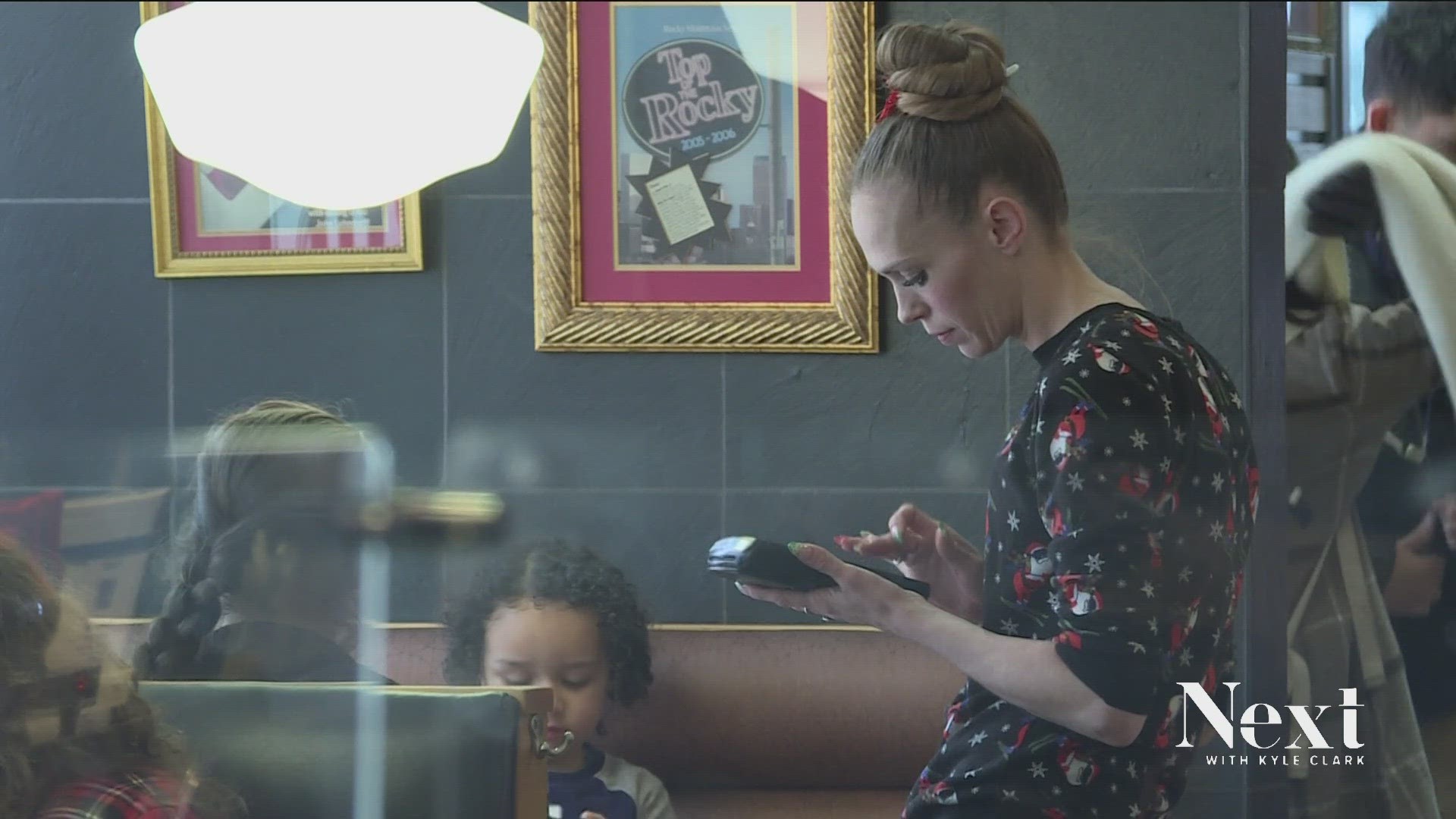DENVER — Minimum wage workers in Denver will soon get a bump in their pay.
Starting on Jan. 1, the minimum wage in the City and County of Denver will be $18.29. That's a full dollar more than the current minimum wage of $17.29.
The scheduled wage increase comes from the city's local minimum wage ordinance, which was approved unanimously by the Denver City Council in November 2019.
In 2024, the minimum wage for tipped food and beverage workers will be $15.27 per hour provided they earn at least $3.02 in tips.
Denver's wage increase requires annual adjustments to ensure wages keep up with Denver’s cost of living.
The minimum wage increase next year is less dramatic than the increase in 2023 due to slowing inflation. Based on the Consumer Price Index for Urban Wage Earners and Clerical Workers (CPI-W), 2024’s adjustment for the Denver-Aurora-Lakewood area was 5.8%, less than the CPI-W of 8.94% for 2023.
Denver's minimum wage is more than twice as high as the federal minimum wage, which has been $7.25 an hour since 2009. Colorado's minimum wage is currently $13.65 per hour.
Business owners and the state are paying close attention to the impact.
The Colorado Restaurant Association surveyed 156 restaurant operators this fall about minimum wage increases starting in 2024. It found:
- 95.2% of Colorado restaurants report an increase in labor costs since 2022, with an average increase of 20%.
- The average Colorado restaurant owner expects payroll costs to increase $78,581 in 2024.
- 87% of Colorado restaurants will increase menu prices.
- 67% will reduce staffing levels.
- 67% will reduce existing staff hours.
- Almost 30% will implement a service charge to increase pay equity between front-of-house and back-of-house staff.
"The last couple years have been a roller coaster ride, actually," said Sam Armatas, owner of Sam's #3 Diner. "Obviously we had a pandemic. Then food prices went crazy. Supply chains went crazy. The minimum wage didn’t stop increasing, so labor keeps on increasing."
The Armatas family has owned several restaurants throughout Colorado for nearly 100 years. He said his non-serving staff already makes higher than minimum wage, so the city's minimum wage changes won't impact that part of his operating costs. But the tipped employee increase, he says, certainly will.
"We're looking at probably an $80,000 increase... in this coming year, on the server minimum wage. How do you accommodate for that?"
Like other owners, he expects to raise prices in 2024. But how much is too much?
"Our theory as a family has always been that the price of a hamburger should be the price of an hour’s wages on minimum wage," he said. "That worked pretty well 5-6 years ago when minimum wage was creeping up. Now at $18.29? I don’t know how many people will go out for an $18.29 burger."
Armatas is still trying to bring his staffing numbers up to pre-pandemic numbers. He was at 100 before COVID, and 73 are still with him. Many of his employees have been on staff for decades.
While restaurants count labor costs, the state is tracking other numbers.
The same state statute that allowed individual communities to set their own minimum wage increases also requires the Colorado Department of Labor and Employment (CDLE) to track wages, unemployment rates and sales tax revenues.
"Our data just shows that overall, Denver doesn’t appear to have lost business activity or sales of goods or services – that’s what sales tax data show. They don’t appear to have lost jobs [either]," said Scott Moss, CDLE's director of the Division of Labor Standards and Statistics.
Pointing out that Denver's minimum wage increases began in early 2020, just before major COVID-19 disruptions to business, Moss said both unemployment and sales tax revenue suffered initially. But CDLE's data shows, as recently as 2022, Denver's unemployment rate and sales tax revenues are recovering faster than many other parts of the state.
"What we found is, on the net, Denver doesn’t appear to have taken a hit. It appears to have done well before COVID hit, after new minimum wage, and recovered a bit more rapidly the past year or two."
That doesn't mean its been easy to run a business.
"We're not making more money, the money is pretty much the same or around less than it was four years ago," Armatas said. "But the food cost went up, the labor costs went up, so you shrink the pennies. We're a volume business."
"Overall, it's good. It's not that its bad. But the cost of doing business has gone up so the margins have shrunk."
More information about Denver's minimum wage is available at DenverWages.org.
SUGGESTED VIDEOS: Latest from 9NEWS
MORE WAYS TO GET 9NEWS
Subscribe to our daily 9NEWSLETTER for top stories from 9NEWS curated daily just for you. Get content and information right now for can’t-miss stories, Next and Broncos content, weather and more delivered right to your inbox.
DOWNLOAD THE 9NEWS APP
iTunes: http://on9news.tv/itunes
Google Play: http://on9news.tv/1lWnC5n
HOW TO ADD THE FREE 9NEWS+ APP TO YOUR STREAMING DEVICE
ROKU: add the channel from the ROKU store or by searching for KUSA.
For both Apple TV and Fire TV, search for "9NEWS" to find the free app to add to your account. Another option for Fire TV is to have the app delivered directly to your Fire TV through Amazon.


